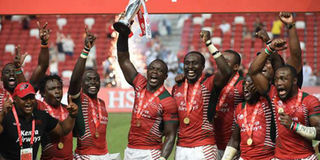Singapore win signals what must be done to lift the sport

Kenya's team celebrate with the trophy after defeating Fiji in the cup final at the Singapore Sevens rugby tournament on April 17, 2016. PHOTO | ROSLAN RAHMAN |
What you need to know:
- Rugby is often called ‘a game of ruffians and brutes played by gentlemen’
- The coach Benjamin Ayimba, cut his teeth at Maseno School and turned up for Impala and Nondies clubs in his playing days.
- He also captained the Kenya Sevens between 2000 and 2005 and had a first stint at coaching the team in 2006.
Is it a coincidence that Kenya won the Singapore leg of the World Rugby Sevens Series 20 years after the inauguration of the Safari Sevens, having been challenging for this trophy for the past 17 years?
The winning team comprised players who turn out for local clubs, such as Kenya Harlequin FC, Mwamba RFC, Homeboyz RFC, Impala RFC, Nakuru RFC and KCB.
The coach, too, Benjamin Ayimba, cut his teeth at Maseno School and turned up for Impala and Nondies clubs in his playing days. He also captained the Kenya Sevens between 2000 and 2005 and had a first stint at coaching the team in 2006.
Having left the technical bench in 2011, he was reappointed head coach last year.
The Singapore win will do a lot to popularise the sport locally even more. It should also be read as a signal that, with commitment, Kenya’s rugby can go places.
Local tournaments such as the Safari Sevens give Kenyans the chance to watch the nation’s teams and judge how the sport is developing.
In particular, the explosive atmosphere within the tournament grounds with all its noises and colours spurs young players to aim to be part of this theatre of one of the most thrilling sports on earth.
With all the challenges that have faced the national sevens and 15s teams, young rugby talent — the next generation of professional players — will be the necessary antidote to previous World Cup woes. That’s precisely what coach Ayimba initiated by fielding some young talent.
Mentors in schools and communities (whether teachers, sports buffs or parents) should encourage more participation in rugby by making it attractive, safe and enjoyable for all young people.
There is a need to constantly remind administrators, coaches, referees and parents that rugby must be administered, taught and provided for the good of young people who wish to play the sport. After all, it is their game.
The pipeline that has produced the Imonyis (Collins Injera, Humphrey Kayange and Michael Agevi), the Asegos (Lavin and Larry) and a host of other rugby families should be properly oiled. This will ensure that there is a generation of playing talent coming through smoothly.
COACHING STANDARDS
It is the responsibility of sports administrators to ensure that equal opportunities for participation in rugby are made available to all.
There should be programmes that offer clinics to improve the standards of coaching and refereeing with emphasis on good technical skills. Equipment and facilities must be appropriate to the maturity level of the young players.
For all its faults, rugby and the people who watch it can teach football a number of important lessons.
First, no matter how demanding the contest, no player will challenge the authority of the referee. If he does, he will be punished, not only with dismissal but also with shame, and nobody will defend such player.
Also, no matter how heated things get on the pitch, no matter how much of strong drink is taken by the spectators, there will be no need to segregate the crowds supporting opposing teams. There will be no obscenities and public disorder. There will be no stone-throwing.
Rugby is a self-policing sport that encourages respect for opponents (yes, even while they are busy smacking one another on the pitch) and, most important, for the game.
Rugby is a sport that anyone of any size, speed or strength can enjoy and contribute to. It makes it a very open and welcoming community.
When people play rugby, they truly play as a team. There are countless instances in any given match where together they accomplish something no individual could do on their own.
Players learn to trust one another. They learn to pass the ball and trust their teammate will be there to receive it.
The extra benefit is that the players learn to be trustworthy and dependable on and off the pitch. They also learn to trust themselves, their own strength and character. These attributes take them far.
Another attractive aspect is the tight-knit rugby community and the colourful rugby culture. There is an undeniable camaraderie between rugby teams. Rugby is often called “a game of ruffians and brutes played by gentlemen”.
Every match is followed by a very unique social gathering, in which rugby songs are sung, traditions passed down and the most valuable player (MVP) at the event announced to the loudest of cheers from both sides equally.




